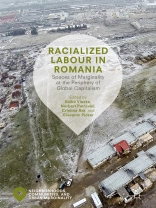This book critically examines the making and persistence of impoverished areas at the margins of Romanian cities since the late 1980s. Through their historical outlook on political economy and social policy, combined with media and discourse analysis, the eight essays of Racialized Labour in Romania forge new and cutting-edge perspectives on how social class formation, spatial marginalization and racialization intersect. The empirical focus on cities and the labour and the plight of the Roma in Central and Eastern Europe provides a vantage point for establishing connections between urban and global peripheries, and for reimagining the global order from its margins. The book will appeal to scholars, students, journalists and policy makers interested in Labour; Race and Ethnicity; Cities; Poverty; Social Policy; Political Economy and European Studies.
Spis treści
1. Introduction: Racialized Labour of the Dispossessed as an Endemic Feature of Capitalism.- 2. Working Status in Deprived Urban Areas and their Greater Economic Role.- 3. Ghettoization: The Production of Marginal Spaces of Housing and the Reproduction of Racialized Labour.- 4. Social Citizenship at the Margins.- 5. Framing the 'Unproductive”: A Case Study of High-Level Visions of Economic Progress and Racialized Exclusion.- 6. Segregated Housing Areas and the Discursive Construction of Segregation in the News.- 7. How Many Ghettos Can We Count? Identifying Roma Neighbourhoods in Romanian Municipalities.- 8. Conclusion: (Re)centring Labour, Class and Race.-
O autorze
Enikő Vincze is Professor in the Faculty of European Studies at Babeș-Bolyai University, Romania
Norbert Petrovici is Lecturer in the Sociology Department at Babeș-Bolyai University, Romania
Cristina Raţ is Lecturer in the Sociology Department at Babeș-Bolyai University, Romania
Giovanni Picker is Marie Skłodowska-Curie Senior Researcher in the School of Social Policy, University of Birmingham, UK












